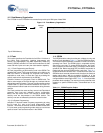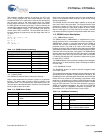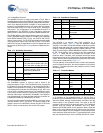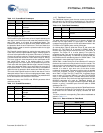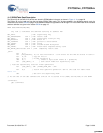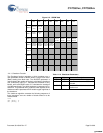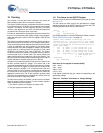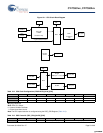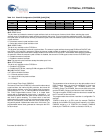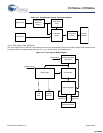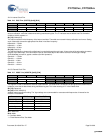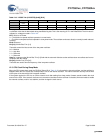
CY7C601xx, CY7C602xx
Document 38-16016 Rev. *E Page 22 of 68
When using the 32 kHz oscillator, the PITMRL/H is read until two
consecutive readings match before sending and receiving data.
The following firmware example assumes the developer is
interested in the lower byte of the PIT.
Read_PIT_counter:
mov A, reg[PITMRL]
mov [57h], A
mov A, reg[PITMRL]
mov [58h],A
mov [59h], A
mov A, reg[PITMRL]
mov [60h], A
;;;Start comparison
mov A,[60h]
mov X, [59h]
sub A, [59h]
jz done
mov A, [59h]
mov X, [58h]
sub A, [58h]
jz done
mov X, [57h]
;;;correct data is in memory location 57h
done:
mov [57h], X
ret
The CY7C601xx part is optionally sourced from an external
crystal oscillator. The external clock driving on CLKIN range is
from 187 KHz to 24 MHz.
12.2 Clock Architecture Description
The enCoRe II LV clock selection circuitry allows the selection of
independent clocks for the CPU, Interval Timers, and Capture
Timers.
On the CY7C601xx, the external oscillator is sourced by the
crystal oscillator. When the crystal oscillator is disabled, it is
sourced directly from the CLKIN pin. The external crystal
oscillator is fed through the EFTB block, which is optionally
bypassed.
12.2.1 CPU Clock
The CPU clock, CPUCLK, is sourced from the external crystal
oscillator, the internal 24 MHz oscillator, or the Internal 32 kHz
low power oscillator. The selected clock source can optionally be
divided by 2
n-1
where n is 0–7 (see Table 12-3).
When it is not being used by the external crystal oscillator, the
CLKOUT pin is driven from one of many sources. This is used
for test and also in some applications. The sources that drive the
CLKOUT are:
■
CLKIN after the optional EFTB filter.
■
Internal 24 MHz Oscillator.
■
Internal 32 kHz Oscillator.
■
CPUCLK after the programmable divider.
[+] Feedback [+] Feedback




